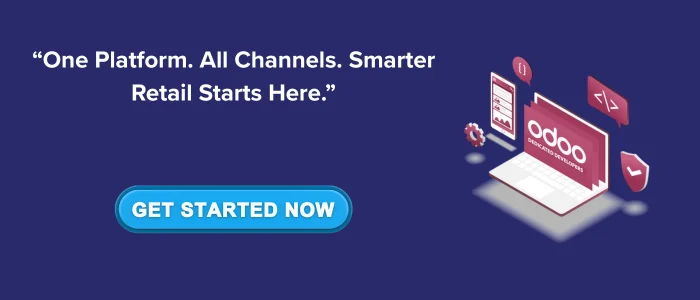Today’s customers expect seamless shopping across stores, apps, and online channels. Meeting that demand requires more than good intentions—it takes a smart, integrated system. Omnichannel retail is now essential, and Odoo ERP delivers the centralized control and real-time insights retailers need to simplify operations with unified inventory, live analytics, and smarter forecasting.
The Challenge of Omnichannel Retail

Managing multiple sales channels—each with unique processes, stock levels, and customer expectations—can overwhelm even seasoned retailers. Common pain points include:
- Fragmented systems
- Manual data entry
- Inventory mismatches
- Disconnected customer experiences
These inefficiencies inflate costs and diminish customer satisfaction, directly impacting sales and loyalty.
Odoo ERP resolves these issues by centralizing operations, automating workflows, and providing a real-time overview of your entire retail ecosystem.
Centralized Control with Odoo ERP
Odoo ERP provides a unified platform to manage sales, inventory, purchasing, customer service, and more all in one place.
- All channels under one dashboard
- Centralized product & pricing management
- Consistent updates across physical and digital platforms
Whether you’re running a chain of stores or managing multiple e-commerce platforms, Odoo ensures everything stays synchronized, reducing errors and boosting efficiency.
Unified Inventory Management
Inventory is the backbone of retail success. Odoo offers real-time inventory tracking and multi-location warehouse management, giving retailers:
- A single, centralized inventory view
- Smart replenishment and reorder rules
- Reduced stockouts and overselling
- Multi-warehouse control with real-time transparency
Real-Time Data Analytics for Smarter Decisions
Odoo’s built-in analytics tools help retailers stay data-driven. With live dashboards and customizable reports, you can monitor:
- Sales by channel or location
- Product performance
- Customer behavior
- Marketing ROI
Enhanced Demand Forecasting
Say goodbye to guesswork. Odoo uses historical data and trends to provide AI-powered demand forecasting so you can:
- Reduce excess inventory
- Prevent stockouts
- Streamline purchasing and procurement
Seamless Integration with E-commerce Platforms
Odoo connects with top e-commerce platforms like:
- Shopify
- WooCommerce
- Magento
- Odoo eCommerce
Orders placed online instantly update inventory and trigger fulfillment, while price and product updates sync across platforms—no manual entry required.
Personalized Customer Engagement
With Odoo’s CRM and Marketing modules, you can:
- Create detailed customer profiles
- Track purchase history and preferences
- Launch targeted campaigns and loyalty programs
- Collect and analyze customer feedback
Mobile Accessibility and POS Integration
Odoo’s POS system works both online and offline, and is fully integrated with ERP features. On-the-go access allows staff to:
- Process sales from any device
- Check real-time inventory
- Access customer profiles instantly
Scalability and Customization
From startups to retail chains, Odoo adapts to your needs:
- Start with core modules like Sales, Inventory & Accounting
- Add CRM, Marketing, Manufacturing, or HR as you grow
- Customize workflows, dashboards, and reports
- Integrate with third-party apps or build your own
Training and Support
Successful ERP adoption requires guidance. Odoo offers:
- In-depth documentation and tutorials
- Active community forums
- Certified partners for implementation, training, and support
- Quick learning curve
- Ongoing assistance
- Maximum ROI
Security and Compliance
Protecting customer data is critical. Odoo provides:
- Role-based access control
- End-to-end encryption
- Audit trails and logs
- GDPR compliance and more
Conclusion
Odoo ERP is more than just an enterprise tool—it’s a strategic asset for retailers looking to conquer the challenges of omnichannel retail. With unified systems, automated workflows, and real-time insights, Odoo delivers a streamlined, scalable, and intelligent retail experience.
Whether you’re optimizing supply chains, integrating sales channels, or enhancing customer engagement, Odoo is your go-to ERP solution.
With Odoo, the future of retail is connected, efficient, and customer-focused.
FAQ's
What is Omnichannel Retail, and Why is It Important?
Omnichannel retail refers to providing a seamless shopping experience across all customer touchpoints—online stores, physical shops, mobile apps, and social media. It’s essential because today’s customers expect consistency and convenience, no matter where or how they shop.
How Does Odoo ERP Support Omnichannel Retail?
Odoo ERP centralizes operations, integrates sales channels, and provides tools for inventory management, customer engagement, and real-time analytics. It ensures consistency across platforms while reducing manual work and operational complexity.
Can Odoo ERP Integrate With My Existing E-commerce Platforms?
Yes, Odoo supports integration with popular e-commerce platforms like Shopify, WooCommerce, Magento, and its own Odoo eCommerce module. This allows for automatic synchronization of product listings, inventory, and orders.
How Does Odoo Help With Inventory Management Across Multiple Channels?
Odoo provides a unified view of inventory, supports multi-warehouse management, automates stock replenishment, and prevents stockouts or overstocking. This ensures accurate stock availability across all locations and channels.
Is Odoo Suitable for Small or Medium-sized Retail Businesses?
Absolutely. Odoo’s modular architecture is ideal for businesses of all sizes. Small retailers can start with essential modules and expand as they grow, while larger enterprises benefit from its scalability and customization options.
Can I Access Odoo ERP on Mobile Devices?
Yes, Odoo is mobile-friendly. It allows managers and sales teams to access key features like POS, inventory, and analytics from smartphones and tablets, supporting real-time operations even on the go.
How Does Odoo Handle Customer Data and Privacy?
Odoo includes robust data security features like access control, encryption, and audit trails. It also supports compliance with global regulations such as GDPR to ensure customer data is protected.
What Kind of Reporting and Analytics Does Odoo Offer?
Odoo provides real-time dashboards and customizable reports to monitor sales, customer behavior, marketing performance, and inventory metrics. These tools help retailers make informed, data-driven decisions.
How Accurate is Odoo’s Demand Forecasting?
Odoo uses historical sales data, seasonality, and promotional trends to forecast demand. This helps optimize inventory levels, reduce costs, and improve product availability across all channels.
What Training and Support Are Available for Odoo ERP?
Odoo offers user guides, extensive documentation, and a large community forum. Certified Odoo partners also provide professional services for implementation, customization, training, and ongoing support.





